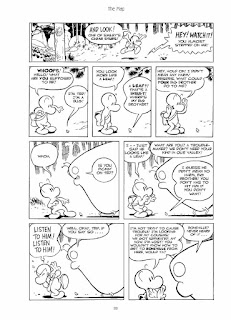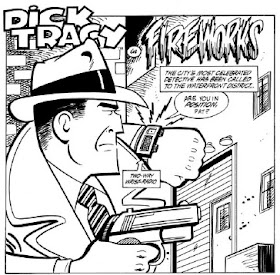Maus: A Survivor's Tale. My Father Bleeds History (1986)
"The Noose Tightens" - Volume 1, Chapter 4
Art Spiegelman
Each time I read Maus, it's as if I am coming to it for the first time. Art Spiegelman's work holds a spell over me - it grabs me and yanks me into the thick of the history, and of the relationships, and I am awash in it as new. I never read this story and do not find something that I interpret a different way, or even see or think about for the first time. My re-read for these reviews has been no different. I continue to read Holocaust literature, as well as discuss Holocaust history and pedagogy with colleagues. Those interactions serve to always shine new light on other resources.
I want to get right to the 100-Word Review, and then move forward with some thoughts about this chapter.
In “The Noose Tightens”, we begin to get the sense that Vladek and his family have reached a point of no return. From the beginning of the chapter to its end, many family members will be lost, and the grip of the Nazis on every aspect of the lives of the Spiegelmans and the Zylberbergs will constrict their daily existence - food, property, movement. Additionally, the sense we’d gotten before that Art and Vladek share a strained relationship in the present will only deepen as Vladek ages. And Art’s mother, Anja? A mystery concerning her post-War writings surfaces.
The Good: I've mentioned earlier in this series that I sometimes feel a little personally tense when Vladek is on screen in the present, talking with Art. Their relationship is toxic - not on the surface, but always bubbling just below. Art is never good enough for Vladek, Vladek's OCD tendencies irritates Art, and Vladek's second wife, Mala (Art's stepmother) seems always caught somewhere on the periphery, yet smack in the middle. For three people, it's a houseful of dysfunction. This chapter begins that way, and in only one page, we feel Vladek's idiosyncrasies at the fore. But you know what? This isn't some throwaway vignette... Rather, it's a table-setting of the events that are about to be documented.
Vladek, once Art's gotten his mind on the events of 1940 and shortly after Vladek's release from the German POW camp, begins to spin a tale of loss - loss of rights, of property, of mobility, and eventually of life. I want to give a short history lesson before moving forward, so readers not fully in tune with German persecutions against Jews can get a sense of how this noose was indeed tightening. The following timeline, which details requirements for German Jews, should spell that out clearly:
1933: All non-Aryan civil servants forcibly retired; kosher butchering outlawed; German nationality can be revoked from those considered “undesirable”.1934: Jewish newspapers can no longer be sold in the streets.1935: Jews deprived of the status of citizenship; marriage and sexual relations between Jews and Aryans forbidden; Jews no longer have the right to vote.1937: Passports for Jews for travel abroad are greatly restricted.1938: Jews must carry identification papers and Jewish passports are marked with a “J”; Jews may no longer own or bear firearms; Jews may no longer head businesses; Jews may no longer attend plays, concerts, etc; all Jewish children are moved to Jewish schools; all Jewish businesses are shut down; Jews may no longer be in certain places at certain times; Jews must hand over drivers’ licenses and car registrations; Jews must sell their businesses and hand over securities and jewels; Jews may no longer attend universities.1939: Jews must follow curfews.1940: Jews may no longer have phones; German Jews begin being taken into “protective custody” = deported to concentration camps.1941: Jews in Germany must wear the yellow Star of David on their outermost garments; Jews may not leave their hometown without permission from the police; Jews may no longer use public telephones.1942: Jews are forbidden to – subscribe to newspapers; keep dogs, cats, birds, etc; keep electrical equipment including typewriters; own bicycles; buy meat, eggs, or milk; use public transportation; attend school.
I want to emphasize that the timeline above would not have applied to Polish Jews; in many cases, these restrictions would have come after the September 1, 1939 invasion that began World War II. From that point, the restrictions on that list would have come like a whirlwind. That makes the story Vladek spins all the more incredible. If we use the list above as a blueprint, then following Vladek's narration we see:
- Restrictions on food acquisition
- Restrictions on work, or job availability
- Black market activities to meet basic human needs through trade and/or money acquisition
- Hiding property from the Nazis
- Roundups - sometimes randomly, paperwork or not a non-factor
- Questions of hiding children - this could have meant permanent separation
- Concentration into ghettos
- Collective responsibility and/or death as a deterrent to certain activities or behaviors
- Hiding people as a way to circumvent Nazi requests
- Confiscation of Jewish property
- Selections by the Nazis of Jews for relocation; this almost always meant deportation to the killing centers
- "Choiceless choices"
Other things that I really liked about this chapter include the cutaway of the hiding place for Mrs. Zylberberg's parents, the detailed images of the town square, and of the selection in the stadium. As we move forward, we'll see that Art Spiegelman has taken great pains to not only document his father's story, but to depict it with historical detail and accurately.
The Bad: The other element that dominates this chapter, though only mentioned twice, is the alleged presence of diaries written by Art's mother Anja. Vladek mentions it somewhat offhand, and Art nearly leaps from his seat. But Vladek quickly qualifies the remark as second versions of her diaries - the originals did not survive the war - and then changes the subject. Near the end of the chapter, as Vladek has fallen asleep, Art makes a comment to Mala about Anja's writings. Mala says she's never seen them, but Art looks anyway. This is a painful episode, and unfortunately foreshadows a grave scene coming later in this volume. It's tough to watch, every time I read it. And when I read it aloud to my students, it seems to carry even more weight.
The Ugly: Whenever you think things have gotten bad, know that they will be soon getting worse. I'm reminded of a line spoken three times in Schindler's List - "The worst is over now." But it never was. There was always a deeper depth to be sunk toward.

























































